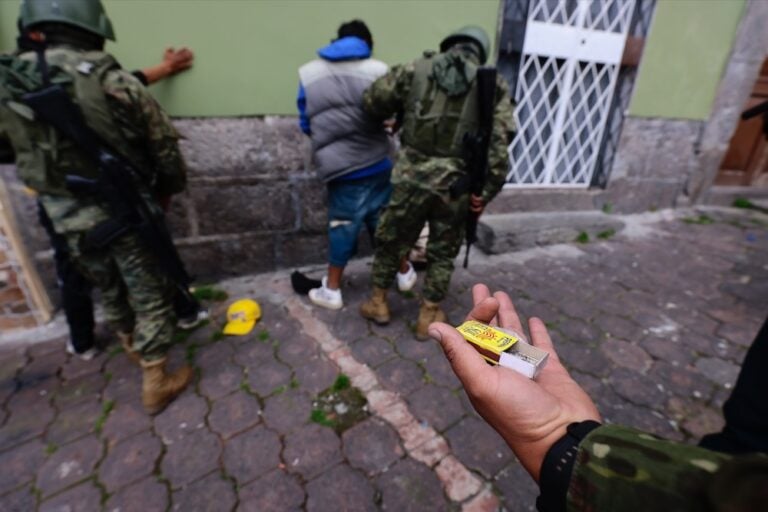President Rafael Correa’s new media law has “undercut press freedoms,” and “opens the door to censorship by giving the government or judges the power to decide if information is truthful”, according to a new report by the US State Department.
President Rafael Correa’s new media law has “undercut press freedoms,” and “opens the door to censorship by giving the government or judges the power to decide if information is truthful”, according to a new report by the US State Department that ranked Ecuador as one of Latin America’s worst violators of press freedoms.
Unsurprisingly, the Correa administration hit back at the US. The Ecuadorian foreign minister, Ricardo Patiño, released a statement which claimed the report was “one sided” and came from, “a country that has a poor track record in observing human rights.”
The diplomatic tussle marked another stage in the deteriorating relationship between Quito and Washington, after Correa offered Julian Assange asylum in Ecuador in August 2012 — the Wikileaks founder still remains at the Ecuadorian embassy in London. However, the report has also highlighted the explicit crackdown on the media by Correa.
At the end of January, Correa’s government lashed out at El Universo newspaper for printing a cartoon which satirised the Boxing Day raid of opposition activist Fernando Villavicencio. Using Supercom, the media regulator established by last year’s communications law, El Universo was ordered to print a correction, and the paper was fined 2% of its average monthly sales. This recent incident marks a dangerous precedent for print media in Ecuador.
The communications law is a sweeping reform to the media landscape in Ecuador that in principle was designed to prohibit censorship, redistribute broadcast fairly and protect the rights of journalists. The reality is that the law is filled with loopholes which are open to manipulation, and allow for state interference — the creation of Supercom is a clear example of such problems.
Martin Pallares, a journalist at El Comercio, said the law, and its “subjective norms,” has led to “tremendous self-censorship and a terrible fear among journalist.” According to Pallares, newspapers are constantly overshadowed by a fear that they will be forced out of business by a heavy fine for publishing an anti-government article. He also said the situation is more worrying because, “Correa controls the judicial system and if he wants he may order that any journalist can be prosecuted for libel.”
Reporters Without Borders has said some aspects of the communications law are positive, praising the “fairer distribution” of broadcast frequencies. But Camille Soulier, the head of Reporters Without Borders Americas desk warned the cartoon incident was the most “obvious case” of the dangers of the law which, “used in this way could foreshadow an increase in the disrespect for freedom of information.”
El Universo‘s cartoon fine was not the only example of Correa intimidating partisan journalists. In September 2012, the magazine Vistazo was fined $80,000 for publishing an article which supposedly advocated a “no” vote against Correa. Then in February 2013, Ecuador’s highest held court upheld a libel conviction against El Universo that imposed a $40m fine and sentenced the three directors of the paper, and its leading columnist Emilio Palacio, to three years in jail each, for an article which accused Correa of human rights abuses. The men were later pardoned by the president, but the case still demonstrates the president’s ongoing bullying of the press.
The El Universo lawsuit had serious implications for Ecuador’s media according to the Committee to Protect Journalists’ (CPJ) Andes correspondent, John Otis. Otis said that after this lawsuit, Ecuadorian publishers and newspapers became more worried about publishing material, even if they knew that all their information is correct. “The El Universo case scares people”, Otis said, because of its potential financial implications.
Incidents such as this libel case have given rise to intense animosity from Ecuador’s media against the president. El Comercio‘s Pallares has accused Correa of Orwellian control of the press. He said: “Correa does not tolerate diversity of opinions because of his deep seated religious background, and other traumas which makes him think he owns the truth. ‘You are a liar and we are the truth,’ he said to a journalist who asked him an uncomfortable question at a presentation at Columbia University some years ago.” While this depiction of Correa is evidently extreme, it is true that the president, now in his third term, set off to battle against the media from the outset.
Antoni Kapcia, a professor of Latin American History, at the University of Nottingham, views the relationship between Correa and Ecuador’s press in a more complex way however. Kapcia said that the press have been, “vehemently anti-Correa from the start,” and “they have not exactly been pursuing the lily-white truth in all these battles.” Kapcia believes that faults have been convicted on both sides of the war. “Correa is as much hitting out in retaliation as repressing the press, and in reality, he doesn’t control enough to really repress, even if he wanted to, so it’s more a case of kicking the press’s shins than really chaining it up.”
With the populist Correa, who has been in power since 2006, recently losing important local elections, the political future of Ecuador remains uncertain. One thing remains clear however, Correa’s crackdowns on Ecuador’s press are a serious threat to the democratic hopes of this Latin American nation.
This article was originally posted on 7 March 2014 at indexoncensorship.org


